|
These Feathers in my War Bonnet
Colonel (Retired) James R.
Spurrier was the first commander of the 2nd Battalion of the
14th Armored Reconnaissance Battalion as it reconfigured from
the U.S. Army constabulary mission in post World War II Germany
to a combat force tasked with the border observation mission
north of Bad Kissingen. In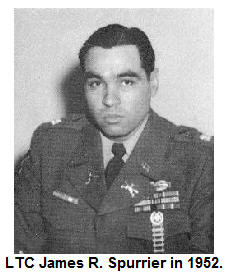 1951, if Soviet forces attacked from Meiningen south along Highway 19, the first line of defense they
would have encountered would have been the troopers of LTC
Spurrier’s command stationed at Daley Barracks. His men trained
hard for just this eventuality. 1951, if Soviet forces attacked from Meiningen south along Highway 19, the first line of defense they
would have encountered would have been the troopers of LTC
Spurrier’s command stationed at Daley Barracks. His men trained
hard for just this eventuality.
Some forty years after the
fact, Colonel Spurrier wrote a limited publication memoir
recalling his life and times, Come Walk in My Moccasins.
The adult children of James R. Spurrier have graciously allowed
us to place on line the chapter of his book devoted to his
assignment in Germany and the heady times of 1949 - 1953 in
Fulda, Schweinfurt and Bad Kissingen. The chapter begins as
Major Spurrier, his wife Lucile and three daughters sail across
the Atlantic for his first European assignment. During World War
II, Spurrier had served with distinction with the First Cavalry
Division in the Pacific and had trained as one of the Army’s
last true horse soldiers. Earlier assignments had been at Fort
Bliss; he was an expert rider, a national level polo player and
an officer with a reputation for getting the job done. He was
the grandson of an Oklahoma Osage Indian Chief.
Due to length, this
chapter is divided into two sections, the first portion recalls
the Atlantic trip, initial assignment in Fulda, transfer to
Schweinfurt, duty with the 2nd Recon Battalion of the 14th
Armored Cavalry as the operations officer, acting battalion
commander and unit executive officer. Far from a narrow military
memoir, however, Colonel Spurrier also tells us much about his
off duty life, his family, hobbies and pets.
The second section begins
with Major ( P ) then LTC Spurrier in command of the battalion
as it moves from Conn Barracks in Schweinfurt to Bad Kissingen.
He recalls the first days on the border, the political climate
in the Kurstadt as a new mayor and the new commander try and
work through a variety of civil - military challenges in the
post occupation Germany and the major maneuvers and inspections
that were the key events in the annual training calendar. This
section ends with the departure of LTC Spurrier from the command
to a staff assignment at Fort Knox.
We have scanned the images
that were published in this chapter of Colonel Spurrier’s
autobiography and merged them to the one line text. Because we
were furnished small size photo copies, many of the scans are
themselves quite small.
Colonel James R. Spurrier
spent twenty - five years on active duty. In retirement beyond
private business endeavors, he founded the U. S. Cavalry
Association at Fort Riley Kansas as a way to focus the support
of those who would cherish the memories and traditions of the
horse cavalry in the American Army. In later years, beyond
writing his memoirs, he remained active with his passions of
riding, polo, golf and his family. Colonel Spurrier was aware of
the Eaglehorse web site and encouraged former members of his
command from those distant days in Germany to assist the site in
any way possible. Colonel Spurrier moved his red and white -
swallow tail guidon to Fiddler’s Green on 27 December, 2004 at
the age of 86 years.
All commercial rights of
the Spurrier memoir are reserved by the estate of James R.
Spurrier.
Chapter 13 of Spurrier
memoir
Part 1
Chapter 13 of Spurrier
memoir
Part 2
Colonel James R. Sprurrier
Obituary
Our Ocean Voyage
The day we were to sail, we
arose early, eagerly gathered our luggage and were ready to
go. The Shirley’s took us to the Brooklyn Port of Embarkation
where we boarded the USAT C. C. Ballou. There was a ceremony
at the port with a band playing and people waving and saying
goodbye to friends who had come to wish them bon voyage. As
the tugs pulled us away from the dock, we waved goodbye to the
Shirleys, and then staying topside, observed our course as we
passed Staten island on the starboard side and out to the
Atlantic Ocean. The Spurriers were off on a new adventure.
A word about our ship;
it had just retuned from Germany with a boat load of displaced
persons. The ship had the distinct smell of disinfectant that
was not all together pleasant. The General C. C. Ballou was
not a large ship as Army transports go. We were told that it
was a notorious roller, that is it had a tendency to rock from
side to side, In fact, it rocked so much that the ship was
used to test Dramamine, a pill for seasickness.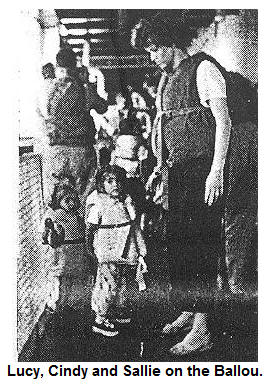
We had a stateroom for
the five of us, which was not too bad, even though it had bunk
beds. Prior to departing we had purchased harnesses for Cindy
and Sallie, which looked like dog harnesses. They worked
wonderfully in that we could keep them under control and keep
them from falling when the sea got heavy, which it did about
half the time. They did, however, look like a couple of
puppies.
Ocean travel was new to
the girls, so we spent the first day getting acquainted with
the ship. We were below the promenade deck with only a port
hole to look out. As Lucile settled us in the cabin, Tricia
and I explored the ship. We found the mess hall ( ward room ),
kitchen ( galley ) and recreation room, made a tour or two
around the promenade deck and in general gave the ship a
thorough once over.
Our first meal aboard
was lunch. If I remember correctly, we were on the first
sitting. The meals were adequate by Army standards but after
more than fifty years, I really can’t recall how good or bad
the meals were.
The first afternoon we
had a lifeboat drill, everyone put on a life preserver and
reported to their boat stations. This was a thrill for the
girls. We put their life preservers on over their harnesses.
After instruction as to lifeboat procedures we were released
to return to our cabins. There were several drills held during
our trip. The only problem we encountered was during movement
to our station which required us to climb several small
stairs. I led with Sallie, followed by Lucile and Cindy, with
Tricia walking on her own, bring up the rear.
We quickly developed a
routine. We awoke, dressed and waited for the mess gong which
told us to report to the dining facilities. In the Army we
call it the mess hall, in the Navy they call it the ward room.
After a pleasant meal we returned to our cabin for a little
rest before we had to leave again so the cabin boys could
clean it.
We went top side and
found deck chairs where Lucile, Cindy and Sallie took sun
baths, weather permitting. We enjoyed the salt air and
watching the ocean waves. Tricia and I took our daily walk
around the promenade deck to stay in shape. We often stopped
at the bow of the ship to view the ocean. Then it was back to
the cabin to await lunch call. Following lunch it was siesta
time. After siesta it was back top side to a recreation room
where the children could play. Lucile, as avid reader, spent a
good part of her time reading.
We were able to make
some friends on the ship. One in particular, which we were to
run into several more times in our service, was Lester R.
Patrick, an armor officer, and his family. The ship’s
passengers were mainly officers, with most being company
grade. There were also three warrant officers and three
sergeants and their families.
There was not much
excitement so one day when someone said they had sighted
dolphins or some other type of marine animal, we all rushed to
the railings to see. We did run into some bad weather about
halfway across which confined most of the passengers to their
cabins due to seasickness. The Spurrier family, I am proud to
say, did not miss a meal, even though at several of them, they
had to put side bars on the tables to keep the plates from
sliding off.
The old hell of a Ballou
lived up to its reputation as a roller as it sure did in rough
weather. At times it was difficult to walk in the aisles and
on deck because of the rocking, but our first experience at
sea was almost over as they told us we would be docking soon.
I think it took eight days to make the crossing.
Germany
Sailing to Germany gave
me time to think about my assignment in relation to the world
situation. Germany was divided into four major zones of
occupation; the British, French, Russian and American.
Foreigners could move easily between the zones with the
exception of the Russian one.
Shortly after the defeat
of Germany and its occupation by the Allies, it became
apparent that the Russians did not trust anyone, and in
reality we became their enemy. There was no free exchange
between the Russians and the other Allies. If you crossed into
their zone of occupation you were arrested. In fact, at the
time of our sailing, the Russians had cut off all ground
resupplying of Berlin which was in Russian occupied East
Germany.
East Germany
To correct the
situation, the Allies established what was known as the Berlin
Airlift, which supplied the non Russian portion of the city by
air. This was quite a feat and the Russians backed down.
Following World War II the major mission of the occupying
forces was the demilitarization and reconstruction of Germany.
The U. S. Constabulary was organized to assist in these post
war efforts. The Constabulary was the only law and order the
Germans had. It assisted them in reestablishing their own
government and by trying to weed out the undesirable elements
( the Mafia so to speak ) that always take advantage of
lawless situations. At the time I arrived, most of the
demilitarization had been completed and the Germans were able
to handle the law and order. So American troops were assigned
the mission of patrolling the Russian controlled East German
border.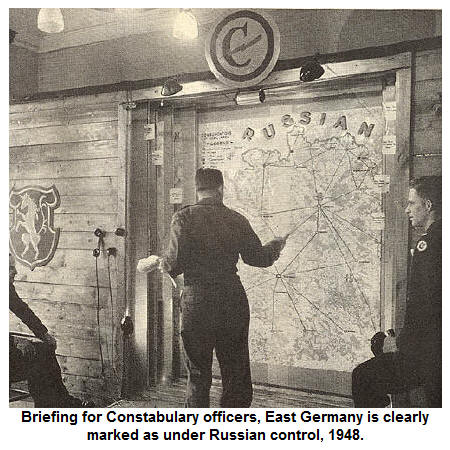
The Constabulary was
organized in a similar manner as the Cavalry Groups of World
War II. It consisted of a Constabulary Headquarters, two
Constabulary Brigades and three Constabulary Regiments: the
Second, Sixth and Fourteenth, each having two or more
Squadrons, that were assigned zones of operation. The
Constabulary troops were equipped with M 8 Armored Cars and ½
ton trucks or jeeps. I addition, each Constabulary Regiment
had a horse platoon to assist in patrolling some of the more
inaccessible areas.
Because of the
international situation and the escalation of the Cold War, it
was decided to reorganize the troops stationed in Germany
along conventional military lines in order to meet the threat
of the Russians. Since the reconstruction of Germany had
progressed to where the Germans now could control and operate
their own government, there was little need for the
Constabulary, as organized. The major effort of the American
forces was patrol of the Russian border. Thus, in late 1948
the Constabulary Squadrons were retained - one for each
regiment.
Each regiment was moved
to the border area and given the mission of patrolling it. The
attached Constabulary Squadron had the actual mission of
patrolling the border with the armored cavalry units as back -
up. The situation required that we have detailed emergency
plans in the event that the Russians decided to attack across
the border.
In addition to the
Constabulary, there was the First Infantry Division and
separate artillery units and Air Force units. When I arrived
the highest command was USAREUR, or U. S. Army Europe, and
they still had the Constabulary Headquarters which soon was to
be redesignated the Seventh Army. The two Constabulary
Brigades remained.
Armored Cavalry
Assignment
We arrived on the
morning of August 4, 1949 at the Bremerhaven Port of
Embarkation after an eight day crossing. We were assembled,
given our assignments and told how to disembark. I was
assigned to the Headquarters of the 14th Armored
Cavalry regiment at Fulda , Germany. We were to immediately
board a train to a town named Fritzlar where the Army had a
hotel. We arrived the next day and were put up in the hotel.
It was very nice with adequate service.
The next day I reported
for duty to Colonel Jack Ryan, the Regimental commander. He
informed me that I would be the Regimental S2, which is the
intelligence officer. This was an active office, mainly just
keeping abreast of the various intelligence agencies in the
European Command ( EUCOM ). Everyone had a finger in the pie
with no one talking to the other at the grass roots level. It
became apparent to me why our intelligence was often distorted
and incomplete. To me it was rather disgusting..
New Assignment: 2nd
Bn, 14th ACR
I contacted the Regiment
Adjutant regarding quarters and I was told that there would be
quite a wait. After a week in the hotel with the girls getting
restless, I knew they couldn’t stand much of this type of
living. I requested to speak to the Regimental Commander and
informed him that I was willing to take any assignment where I
could get quarters. I must have hit him on a good day as he
called the 2nd Battalion which was located in
Schweinfurt, Germany and found that I could get immediate
quarters. So, I was transferred to the Second Battalion on the
12th of August, an assignment that turned out to be
a boost to my military career. The next morning we departed
via Army sedan
Conn
Kaserne
Our destination was Conn Kaserne
in Schweinfurt. In Germany camps and forts were called
Kasernes and this one had served as a German Air Corps (
Luftwaffe ) base during the war. The hangers made adequate
facilities for our tanks and vehicles and the barracks were
more than adequate for each company as was the headquarters
building. We also had a dispensary complete with a German
doctor.
The officers and noncommissioned
officers had satisfactory quarters about five miles away in
the city of Schweinfurt, we had a good BOQ and a really snazzy
Officer’s Club. We also had an NCO Club and a Service Center
for all other grades plus a PX and a commissary.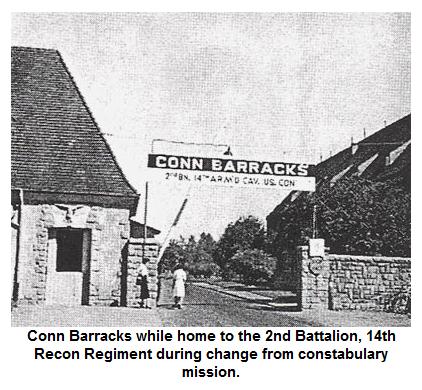
Our Officers Club was unique in
that it had the only circular bar in Germany. We had a lot of
visitors that came just to see the bar. There was a big sign
over the front door that read, “ EVERY NIGHT IS SATURDAY NIGHT
IN THE CLUB “. We had an orchestra on Saturday night and most
of the officers attended the dance. This made for good morale
and the development of loyalty to the organization.
Schweinfurt
was located a little over two hours south of Fulda. I reported
to the acting commander who was a major by the name of Bud
Simmons. The Battalion was to get a new commander, Ralph
Dickie, in October. He was currently assigned to the 1st
Constabulary Brigade and would take command after the
impending large maneuver. I was assigned as the battalion
operations officer.
After arriving we were shown to
our quarters. I left Lucile and the girls to take over and get
the house in shape. We were assigned a set of completely
furnished quarters at 2 Am Sand, on the 14th of
August. A maid came with the quarters, and we hired Marta
Smyth as a nursemaid for the children. Since security was
important, we purchased a Schaferhund ( German police dog )
and we named her Crystal. At least the girls could get settled
and start enjoying their new adventure.
Tangerine Returns Home
We had a few days before the
maneuvers started and I had the opportunity to fly down to
Stuttgart in one of the battalion’s L - 5 light aircraft to
pick up Tangerine, the long missing cat. The Dix had had her
since we departed from New York and I figured they were
getting tired of her by now. She was glad to see me and I was
right, the Dix were glad to see her go. She had traveled a lot
better than we had, as she had flown all the way from New York
to Schweinfurt.
Exercise Harvest
I arrived at a critical time for
the battalion because it was scheduled to participate in the
first large maneuvers in Germany since World War II.. Also, it
would be the first time the battalion would operate as an
armored cavalry unit. The maneuver was called Exercise
Harvest, and as the operations officer I was deeply involved
in getting the battalion ready to participate. After being on
the job for about four days Bud Simmons came into my office
and said the we had a new Battalion Commander. I asked if
Colonel Dickie had arrived, he said no, so I asked who the new
commander was, and he said you, meaning me. I said that can’t
be true as the dates of rank were checked before being ordered
to the Battalion. He informed me that there was a mistake in
his date of rank as some of his reserve time was credited as
active duty time. Reserve time was not accountable in
computing dates of ranks. I often wondered why he suddenly
came forward at that particular time.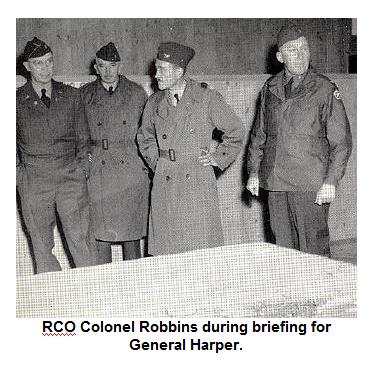
This was a very awkward situation
for me. Taking the battalion on maneuvers with so little
experience with them and being there only a few days was going
to be tough. I did not know the personnel. To further compound
the problem it was the fist time that I had been assigned to
an armored cavalry unit.
Here I was as a new commander
taking the battalion on one of the most important post war
maneuvers in Europe. The situation was such that it could make
or break me. The only good thing was that I had a general idea
as to what the maneuver would be. There comes a time in one’s
life where luck takes the upper hand. Such was my case.
Being my first assignment with an
armor unit, I had a lot to learn. Though I generally knew the
organization of Armor Cavalry units, I was not sure of their
equipment. I did know how to lead and had a good head for
tactical situations so I learned as I went. I found out
quickly that the battalion was not disciplined and was lax in
responding to orders. I let them know that when an order was
given they were to respond immediately. I ruffled some
feathers right at the start but it paid off.
I think I think I performed quite
well on the maneuver. The first day, the Regiment attacked in
two columns, I was on the left flank and had the mission of
securing a bridge over the Main River at Aschaffenberg. We
didn’t waste any time getting there. However, upon arriving we
found that the bridge had been destroyed so I immediately
changed the route of march to the bridge at Hanau that the
other battalion was to secure. I arrived before that battalion
secured the bridge and set up a defensive position at the
bridge. The Regimental Commander was surprised to see me. I
guess he wondered how I got there so fast.
My Major Maneuver Feat
At that time, the 1st
Constabulary Brigade had only one regiment under its control
the 14th. The brigade was commanded by Brigadier
General Arthur G. Trudeau, who saw an opportunity to command a
unit directly and ordered my battalion to be detached from the
regiment to operate independently. We were called Task Force
Sugar and performed several missions that pleased him.
The major accomplishment that set
a feather in my war bonnet occurred toward the end of the
maneuvers. I was ordered to go into Brigade Reserve and was
given the general location of my assemble area. This was near
Grafenwohr, one of the major training areas which had a
dominant terrain feature called Hopfenohe Ridge. According to
the scenario of the maneuver, the Constabulary had been
fighting a delaying action against the 1st Infantry
Division. The forward troops retreated through my reserve
position and no one ordered me to move so I stood pat. From my
position, I saw the 1st Infantry Division in a
typical infantry division text book attack formation with two
regiments abreast and one in reserve followed by their tank
battalion. As they neared my position they turned right and
moved across my front toward Hopfenohe Ridge. The 1st
Infantry Division’s Tank Battalion was commanded by Creighton
W. Abrams, Armor’s most respected tank commander from World
War II and later to be Chief of Staff of the Army. I could not
have been in a better position to cause the 1st
Infantry Division some embarrassment by attacking their tank
battalion which was completely out in the open.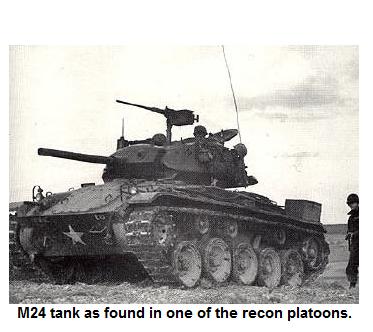
Since I was under control of the
1st Cavalry Brigade, I immediately contacted
General Trudeau and apprized him of the situation and told him
that I could cross the “ T “ if I could get more tanks. He
immediately ordered that I was to receive the tank companies
of the other two battalions. I was in the process of deploying
my troops when General Handy, USAREUR Commander, chose that
time to visit my CP.
He was directed to my location
where he could observe the actions of the 1st
Division and the positioning of my tanks for the attack. He
was briefed on the situation and told me to continue what I
was doing. He could see by the situation that we could
embarrass the Big Red One, and being its former commander and
an infantryman, he apparently did not want this to happen
because as I was about to give the order to attack I received
a frantic call from General Trudeau. I mean frantic as he kept
yelling several times into his mike, “ Do not attack, I repeat
do not attack”. This terminated my one moment of glory.
However it was noted, recorded and reviewed by my
contemporaries as well as higher commander. Shortly
thereafter, the maneuver was terminated ahead of schedule. I
was proud of my performance and that of the Battalion. Our
actions during these war games was another feather in my war
bonnet.
Back to Garrison Duty
Upon returning from maneuvers I
became acquainted with my unit. It was a modified armored
cavalry reconnaissance unit with three reconnaissance troops,
a tank company and a headquarters company. Each reconnaissance
company had three platoons with a scout section of four jeeps,
a tank section of two M 24 light tanks and infantry squad
mounted on a ¾ ton truck and mortar section also mounted in a
¾ ton truck. The tank company had three tank platoons with
five M 26 medium tanks each. The headquarters company was a
normal one except it had an air section of two L - 5 light
aircraft.
It was a reasonably new
organization and needed a lot of direct instruction. After a
period of rehabilitation where we fixed our equipment and
cleaned our gear from the wear and tear of the maneuvers, we
entered into serious training.
German American Relations
Our status with the Germans was
that we were still the conquerors though we had little
official business with them. This was handled by the HICOG,
which meant High Commissioner of Germany, an organization
operated under the State Department. They had an office and
representative in Schweinfurt. We also had an MIT or Military
Intelligence Team, also located in the town. The logistics of
the area were handled by what was called a base command. It
handled all billeting, ran the PX and Commissary and all other
administrative issues connected with every day living. There
was a lot of black marketing going on by Americans stationed
in Germany. One would be surprised what one could get for a
pound of coffee or a carton of cigarettes. There was a
silversmith located in Stuttgart that serviced the U.S.
Military and most troops came home with valuable silver. We
were no exception.
Schweinfurt was considered a
large town according to Germans standards. Located on the Main
River, it’s claim to fame during World War II was that it was
the town where Willie Sacks had his ball bearing plants.
Schweinfurt was a favorite target for our bombers. The Air
Force tried hard to knock out the ball bearing factories but
the report I received from the local citizens was the
manufacturing of ball bearings was decentralized to basements
throughout the town. I was told that production never fell
below 80%. Flying from the west to the east you could see
where the bombs landed, starting about 50 kilometers out, as
the fly boys did not like the flak over the city. All the time
I was there, we had no problem with city government or
townspeople.
Meeting the French
Shortly after the maneuvers, I
was appointed by General Trudeau to represent him in a French
maneuver held in their zone of occupation. I packed my field
gear, departed and arrived at the French headquarters on 27
September 1949. This was probably a pay back for the work that
I did for him during Exercise Harvest. I departed for
Kaiseresch in the French Zone, found the French Army
Headquarters in charge of the maneuvers and reported in. I was
given a room in a local Gasthaus where the headquarters
personnel were staying.
We could take a lesson from the
French when it comes to comfort during a maneuver. The first
night was my introduction to the French way of life. We
assembled prior to dinner for cocktails and socializing. At
dinner we were served one course at a time. Soup, salad,
entrees and desert. That meant we ate one dish at a time and
upon the completion of that dish we were served another. At
each course, we were served a different wine, we must have run
the gauntlet from port to sherry to stronger table wine. This
was the arrangement that we repeated each night as we moved
from Gasthaus to Gasthaus. It was hard for me to follow the
plan of their maneuver, It seemed to be more like our CPX
where command personnel are used because they had a minimum of
troops. It was a good experience for me to see how another
nation’s military operated and it was another feather in my
war bonnet.
New Commander Arrives
I remained in command of the
battalion until late in October when Ralph Dickie took charge.
He had been a staff officer for General Trudeau and was being
rewarded for his work. I became the executive officer and was
a help to him, as he had not been around troops for quite some
time. He was easy to work with so I had no complaints. There
was also a change in Regimental Commanders, as James B. Quill
assumed command.
Intelligence School
It was during this time I was
selected to attend, what I considered to be the most
outstanding training available on Communism. It was conducted
at the theater’s intelligence school that was staffed with
instructors who were former members of the Communist Party in
Germany and Russia. It was an eye opener. This was where I
first head the term “ Dialectical Materialism”. I am not sure
that I thoroughly understood it, other than it was the
doctrine of Karl Marx. It was the combining of materialism
with logical dialectic between two forces, which developed a
thesis and antitheses.
One of the communist instructors
said that if you had been taught that two time two was four,
and the government said that it was wrong, that two times two
is now six, that is what you accepted. I seem to see some of
this theory in our present day government. What used to be a
privilege is now a right.
Social Activities
A town near Schweinfurt named Bad
Kissingen had a nine hole golf course that I managed to play a
few times. The Constabulary had a golf tournament at a resort
area named Garmish - Partenkirchen, which the U. S. Army had
appropriated for morale and welfare purposes. Garmish was
located near the Swiss and Austrian borders in the Alps, the
major mountain range in Europe. While I didn’t play very good
golf during the tournament, the 14th Armored
Cavalry Regiment won third or fourth overall in the team
standings. We had a hole in one contest, where I won the money
for the closest to the pin. Lucile and I had a delightful
time, and decided we would like to return.
In October, we went to visit the
Dix family in Stuttgart on Lucile’s 30th birthday.
There was a big party with all of the former Fort Riley
friends attending. General I. D. White, former commander at
Fort Riley, was now the Commanding General of the U. S.
Constabulary. This is the reason so many former Fort Riley
people were assigned to the Constabulary.
Horse Show
Late in the fall, I decided we
should have a horse show. The opportunity presented itself
when the horse platoons of the Constabulary were deactivated
and the horses stabled in Schweinfurt. Bob Borg, 1948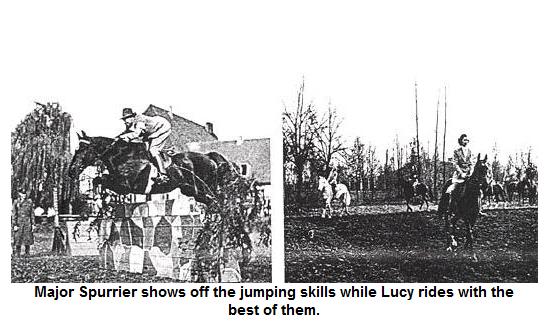 Olympics
Equestrian Team member, was put in charge of the arrangements
for the show. I had known Bob at Fort Riley during the train
up for the Olympics and he was more than qualified for the
job. Olympics
Equestrian Team member, was put in charge of the arrangements
for the show. I had known Bob at Fort Riley during the train
up for the Olympics and he was more than qualified for the
job.
Lucile and I invited several of
our Fort Riley friends namely the Scherrers, the Henrys, the
Burtons, the Dix , the Gammons and the Hopkins to participate.
We had several classes, Lucile won the ladies equitation class
and I won the open jumping in a jump off with Ralph Dickie. It
was a close competition because, being the Battalion
Commander, Borg gave him the best jumper. Following the show
we had a rip roaring party at the Officer’s Club. We played
musical chairs around the bar, where you had to take a sip of
the drink left by the person who originally sat on that stool.
Garrison Life
We spent our first Christmas in
Germany thinking of our loved ones at home. The Christmas
Holidays were celebrated by the Battalion in the traditional
manner, with gatherings and good cheer. It was truly a white
Christmas, as the snow was very deep. The commander’s
reception and party was held on New Years Day.
Shortly after the first of the
year, Lucile said that she would like a larger house. I talked
to the Sub Post Commander to see if anything was coming up.
The only thing he saw was a large house the Military
Intelligence Team was vacating, but, he said he did not have
the money to paint it. I asked him how much would it take to
paint I?. He said three hundred dollars, so I said that I
would pay for the paint. I think he was putting it to me, as I
did not have a lot of respect for him. Anyway it was done and
we moved into 7 Loehlein.
Tank Training at Belsen
The first part of 1950 found the
Battalion performing garrison duties with inspections by
higher headquarters, followed closely by tank gunnery. Our
training area was limited, so we were ordered to take our
tanks to Belsen in the British zone. I was designated to be in
command of this operation. It was the only tank range in
Germany that permitted tactical firing. Tactical firing meant
to move and shoot under simulated tactical situations. This
range was developed by noted British Army tank expert, Colonel
Witherage, their leading authority on armor operations, It
provided realistic conditions for an excellent training
opportunity. The troops really liked the course and did well.
This was also my first experience
with what is called a “ Dining In “. It is a British Army
tradition which our Army later adopted. The Dining In was
called at the discretion of the President of the Officer’s
Mess and he called one just before we departed. If you haven’t
been to a Dining In, let me tell you it is quite an
experience. The first part is very formal, with all officers
in their dress uniforms. At this one, there was a lengthy pre
dinner cocktail hour, so everyone was in high spirits when the
dinner began. I was seated next to the Colonel and after
dessert, he called for attention and offered a toast to the
Queen, following his toast I gave a toast to the President of
the United States. After my toast I was surprised to see all
the Brits suddenly duck under the table, and rear up on
command rising to pelt me with biscuits, and it was downhill
from there.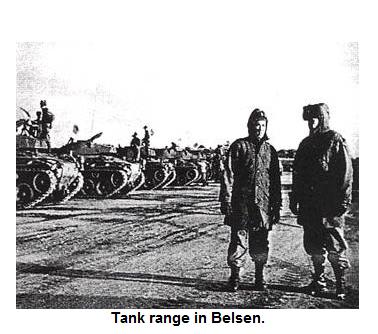
We played a lot of games like
riding to the hounds by sitting backward on our chairs and
hopping them around the long table, and “ Are you there
Moriarty?” where two individuals were blindfolded and lain on
the floor with rolled up newspapers and grasping their
opponents left hand in a hand shake. The object of the game
was when one would say, “ Are you there Moriarty””, the other
would try and hit him. The British played rough and partied
hard. They had a band and I saw one British officer pour beer
down the saxophone. The party continued until the wee hours of
the morning. You would never believe how rough we looked the
next morning.
Close to the camp was Belsen, one
of the infamous Nazi concentration camps. I took the
opportunity to visit it and, like the rest of the world, was
shocked at the atrocities performed there. The British made a
memorial out of it and I heard they forced the Germans to go
visit it.
Near Belsen was the Rolliflex
Camera Company. I owned one of their cameras of pre World War
vintage, so I was interested in seeing their operation. I
visited the factory while we were there and found out that
they could update my camera, so I had them do it.
Affects of the Korean War
In June 1950, the military and
political complexion was changed by the attack of the North
Korean across the 38th parallel, A war between
North and South Korea began. Shortly thereafter the United
States entered the fray calling it a “ Police Action”. You can
call it what you want but when someone is shooting at you,
it’s war.
Because of the Cold War, the
United States was worried about what the Russians would do. We
started building up U. S. forces in Germany. In the fall of
1950, renovation of German facilities was begun for the
deployment of greater numbers of U. S. forces. In Schweinfurt
there was a large German Army Kaserne that was empty. Could
easily house a regiment and it was marked for renovation.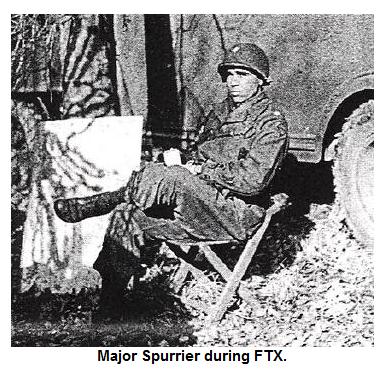
In the late fall we were informed
that a regiment of infantry would be moving into that Kaserne
in the spring. We were told that upon completion of the
renovation, we would move to Bad Kissingen about 30 kilometers
up the road. We were happy as Bad Kissingen was a Kur town, or
a health resort. It was untouched by WW II. It had a Kaserne
called Manteuffel which would house a battalion, just right
for us.
In late 1950, Ralph Dickie’s tour
was up and he and his family headed home. By this time my old
friend from Fort Ringgold, Chandler P. Robbins had arrived and
assumed command of the Regiment, He made the decision to give
me command of the Battalion even though I was still a Major.
This was another feather in my war bonnet.
By early 1951, the Korean War had
escalated, so temporary promotions were opening up and it also
was the year for the big build up of troops in Germany. One
infantry division, the 24th, one armor division,
the 2nd, arrived in Germany along with other
independent armor and artillery units, plus supporting troops,
The U. S. Constabulary became the 7th Army and the
Constabulary Brigades were deactivated and V Corps activated.
We became V Corps troops. Annie and Laine Lee came over with
the 2nd Armor Division along with many of my old
friends to include one of my lieutenants from World War II,
Johnny Nichols, and one of my old OMA friends. Bill Long. My
battalion received new tanks, the M 47 medium and the M 41
light tanks along with the M 13 personnel carrier.
The year 1951 was also a
difficult year to be a commander. In the fall we started
integration of troops. I received ten percent black troops. It
was easy for one to take a philosophical point of view on
integration but at the grass roots level it was not so easy.
Both sides were skeptical, thus we experienced a decrease in
our efficiency. It took quite a while before the troops
accepted one another and started working as a team.
We faced another problem, that of
German independence, Up to now we had been the conqueror, thus
making our own rules. Now, they said love thy brother and
abide by his rules. This produced a lot of serious incidents
between the Germans and the American forces it took time to
reorient the thinking of our troops to this situation.
Part 2
My battalion made the move
to Bad Kissingen into the newly renovated Manteuffel Kaserne,
on or about the 1st of May. It had everything we
needed, excellent barracks, good motor pools, a large
consolidated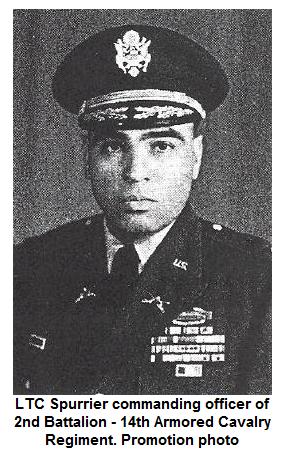 mess, a PX, small commissary, a Service Club an
NCO Club as well as an Officer’s Club located in a hotel
downtown. This was ideal for me, being located some sixty
kilometers from the regimental headquarters in Fulda. This
meant that I was not under the gun, so to speak. mess, a PX, small commissary, a Service Club an
NCO Club as well as an Officer’s Club located in a hotel
downtown. This was ideal for me, being located some sixty
kilometers from the regimental headquarters in Fulda. This
meant that I was not under the gun, so to speak.
My position as commander
of the 2nd Battalion was assured on the 7th
of July when I was promoted to Lieutenant Colonel. So, while
1951 was pretty tough in many respects, it was a banner year
for me, as I had an outstanding command, a good house to live
in and servants to help Lucile.
Bad Kissingen
Bad Kissingen’s health
resort provided hot mineral baths, mud baths, and other
medical treatments. It had an inhaleatorium, which is a tall
structure that emits a water mist which the patients inhaled.
The town was sufficiently strong during the Nazi years to keep
German combat troops out of it. The Kaserne had been used to
rehabilitate wounded soldiers. It was a very quiet place by
nature and the city wanted to keep it that way. So, they were
not happy at all with the noise our tanks made as we rolled
through town.
The town was not touched
by the war, so all of the building were intact. It had old,
sedate hotels, excellent restaurants and Gasthauses. It had
one of the most outstanding kitchens in Germany, called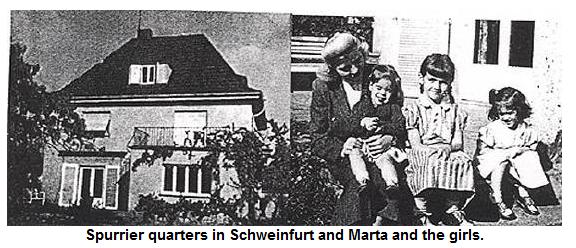 Aumsteads. This is where I first learned to eat Schnecken or
snails. The restaurant served them as an entrée, I ordered
then as an appetizer which upset the waiters to no end. This
also is where I developed a taste for good wine, namely a wine
called Neiderstiner, a Mosel wine. I couldn’t remember the
name so I kept a copy of the bottle label in my wallet. Aumsteads. This is where I first learned to eat Schnecken or
snails. The restaurant served them as an entrée, I ordered
then as an appetizer which upset the waiters to no end. This
also is where I developed a taste for good wine, namely a wine
called Neiderstiner, a Mosel wine. I couldn’t remember the
name so I kept a copy of the bottle label in my wallet.
We were told that the
Tsar of Russia and his entourage had come there each year for
six weeks to take the cure It was said the town earned enough
money during that period of time to last them the rest of the
year.
Border Duty
Life on the border for
the American soldier underwent several changes because of the
Korean and Cold Wars. We were a very busy bunch. Because of
our close proximity to the East German border, if the Russians
decided to attack, we would be the first ones to engage them.
To prepare for this, each unit built defensive positions and
war plans were developed at the highest levels, called the GAO
or General Alert Orders. Alerts were held at all times of the
day and night. Once the alert was sounded, units were to load
their vehicles, clear the Kaserne and go directly to their
defensive positions. As we became more efficient, the first
battalion vehicle out of the motor pool could clear the
Kaserne in fifteen minutes.
There was also a GAO for
dependents. They were required to keep supplies on hand and a
map of the route of withdrawal which was to be in a convoy.
The immediate priority was to get them across the Rhine River
and then to either France of Switzerland. Thank goodness
nothing ever happened because I think it would have been a
disaster.
Prior to this time, the
24th Constabulary Squadron patrolled the border in
front of the 14th Armored Cavalry Regiment. This
squadron was deactivated and the 14th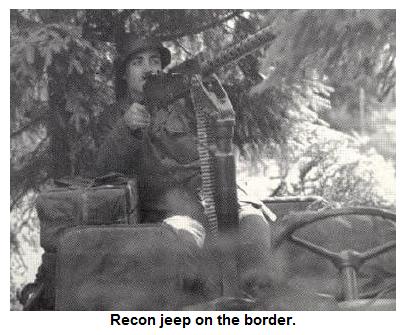 Armored
Regiment was ordered to assume the responsibility of
patrolling the border. My battalion had the responsibility for
the area between the 1st Squadron to the north and
the 2nd Armor Cavalry Regiment to the south. A
company was moved into tents closer to the border for this
purpose. At the grass roots level, all we did was observe the
movements of the Russians on the other side and they did
likewise. Armored
Regiment was ordered to assume the responsibility of
patrolling the border. My battalion had the responsibility for
the area between the 1st Squadron to the north and
the 2nd Armor Cavalry Regiment to the south. A
company was moved into tents closer to the border for this
purpose. At the grass roots level, all we did was observe the
movements of the Russians on the other side and they did
likewise.
There was always
something happening, such as when one of our scout section
commanders wandered across the border and was captured by the
Russians. As I recall, he was not one of the smartest scout
section commanders and after being interrogated they released
him to cross back to our side. This caused a flap all along
the chain of command, we had several intelligence personnel
wanting to talk to him. They soon found out all he could tell
them was that he was captured and taken to a building about
five kilometers from the border where they asked him questions
about his unit. When the Russians apparently had all the
information they could obtain, they released him.
The battalion continued
its normal training cycle and spent a lot of time preparing
for three main inspections; the Command Maintenance
Inspection, the Inspector General Inspection and the Tactical
Training Test. In 1951, all of the companies except
Headquarters received a rating of superior. I vowed the next
year every company to include the HQ would receive a superior
rating.
Family Life
On June 13th,
we moved into our new quarters at 4 Ruckerstrasse in Bad
Kissingen. It was a former Nazi bigwig’s house. It was three
stories tall, with six bedrooms and three baths. There was a
normal living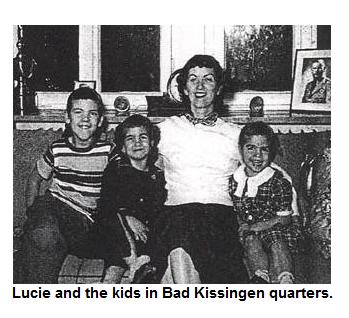 room, dining room and kitchen in addition to a
den. It had a Rathskellar - or basement. It sat on a hill
where we could see the city. It was more than adequate and
very comfortable. We brought our maid Marta who had been with
us in Schweinfurt to continue looking out for the girls. We
also picked up another maid that did the cooking. It was also
an excellent house for entertaining. room, dining room and kitchen in addition to a
den. It had a Rathskellar - or basement. It sat on a hill
where we could see the city. It was more than adequate and
very comfortable. We brought our maid Marta who had been with
us in Schweinfurt to continue looking out for the girls. We
also picked up another maid that did the cooking. It was also
an excellent house for entertaining.
The children appeared to
enjoy their life in Bad K. The post established a school which
was more than satisfactory as it functioned like a stateside
school. In the winter time they enjoyed sledding in the front
yard. Marta was excellent as she kept them entertained and
happy. We also received a visit from the Lee family, soon
after they arrived in Germany. This permitted them to renew
their friendship with their cousins.
Outdoor Recreation
Bad Kissingen had a nine
hole gold course which the Army had taken over as a special
service activity. Only Americans were allowed to play on the
course. Needless to say, I really improved my golf game.
Germany is farther north than most people think, so the days
in the summer were long, We quit work at five so after work
you could get in eighteen holes before it became too dark
which was between nine and nine - thirty. I was able to
improve my golf game to the point where I was shooting in the
mid seventies. I introduced Lucile to the game and she had a
natural flare for it. She is left handed but I talked her into
trying to play right handed and she did not have any problems
as she is somewhat ambidextrous.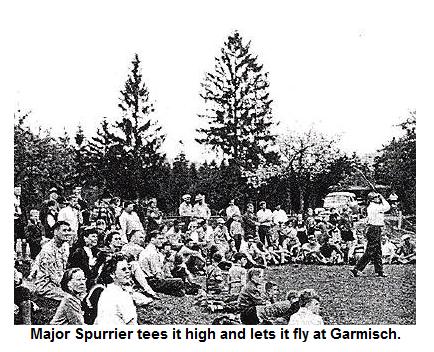
The Bad Kissingen area
was also a good hunting spot. Our good friend, Art Allen, who
served with us in the 12th Cavalry at Bliss,
commanded our 3rd Battalion. He picked up a
valuable sixteen gauge “ over and under “ shotgun that he had
failed to register when he came to Europe. I was still under
the legal time to register a gun so he gave it to Lucile. I
took Lucile on several bird hunts. We hunted reapune, or
wachtel, a partridge that lived in the cabbage patches and ran
on the ground. They would run dogs wild trying to keep up with
them.
In the winter it was
good duck hunting on the Saale River that ran through Bad
Kissingen. It was a small river that twisted a lot. We hunted
ducks by what we called jump shooting. We would walk a
distance away from the river until we heard quacking, then
sneak up to it and cause the ducks to take flight while we
banged away. One day, I heard ducks in a U bend in the river
that had a cliff on the opposite side from me. When I jumped
the ducks they had to fly almost directly over me to get away.
It was a good day as I went five for five. In Germany we were
authorized to carry five shells in our shot guns.
In addition to fowl,
there was good deer and boar hunting as well. All wild animals
belonged to the state, thus hunting was scrupulously
controlled. You had to have a Jagermeister, who was like a
game ranger.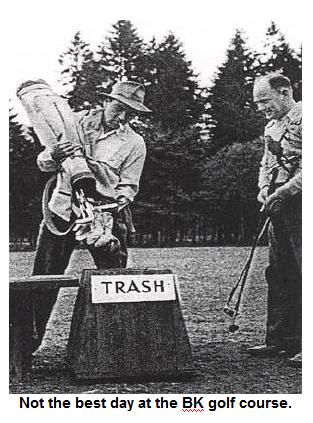
I remember taking Lucile
on a boar hunt, The Jagermeister took a bunch of beaters
through the underbrush to drive the boars toward us. In thick
brush they would use the Dachshund to flush the boar. We sat
in a hunt seat the Jagermeister had erected. It was built
about ten feet above the ground and normally sat four. I
called it the hope seat, as you hoped you would get something.
Deer hunting was the same, except the seats were located where
the deer grazed. The best hunting time was just at dusk in the
evening when the deer came out to feed.
An Outing With the
Air Force
Shortly after moving to
Bad Kissingen, I found out that an old Oklahoma Military
Academy friend, Otto B. McIver, who was a lieutenant colonel
in the Air Force was stationed below in Wurzburg. I made
contact with him and he invited us down for the weekend. Otto
threw a party that Saturday night at the Officer’s Club and we
had a big time, somehow making it back to his house at the end
of the evening, The next morning we were awakened by our
hostess with a drink called Moose Blood. Moose Blood is maple
syrup and bourbon, but she didn’t tell us that until after we
drank it. It wasn’t bad though.
Wedding Bells
Our social life usually
centered on Saturday nights at the Officer’s Club. But,
sometimes it deviated as when two of my officers got married.
The first was Lieutenant Johnny Jones and Elaine. She came
over from the States to marry him and it was quite an affair
as the whole battalion took part in the festivities. The
second wedding saw Lieutenant Jack Noll marrying Nadine, a
local Red Cross worker. Prior to the wedding Jack was thrown a
rip - roaring bachelor party. There was much alcohol flowing
and everyone made sure the prospective groom had a snoot full.
He barely made it to his own nuptials. After the ceremony the
newlyweds took a spin around the Kaserne in one of our tanks.
A good time was definitely had by all.
The second year of my
command was also very busy, from a military pint of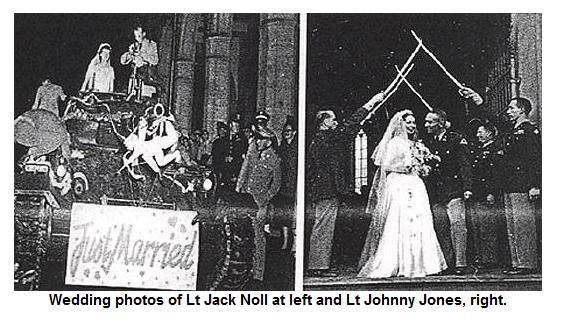 view. We
continued to patrol the border however, by summer time we were
authorized to bring the company who had been living in tents
near the border, back to the barracks. Various inspections
continued as well as intensified patrolling. Every month I had
to go to Headquarters in Fulda for a battalion commanders’
meeting. To me it was a waste of time and nothing really came
out of the meetings as it was more of a briefing for the
regimental commander. view. We
continued to patrol the border however, by summer time we were
authorized to bring the company who had been living in tents
near the border, back to the barracks. Various inspections
continued as well as intensified patrolling. Every month I had
to go to Headquarters in Fulda for a battalion commanders’
meeting. To me it was a waste of time and nothing really came
out of the meetings as it was more of a briefing for the
regimental commander.
Sometimes because of the
weather, I had to say over night. On one of these occasions, I
stayed with Stella and John Hopkins. His battalion was
stationed in Fulda with the regiment headquarters, so he was
under the gun where the Regimental Commander could see
everything he did. I recall a remark he made while watching
his battalion fall out for retreat. He said, “ There are over
seven hundred solders out there, and any one of them could
ruin my military career ”. This was true as the tables had
been turned, we were no longer the conqueror, we now had to
love thy brother ( Germans ) . Serious altercations between
the locals and soldiers were now looked upon by higher
headquarters as serious incidents, which the commander had to
investigate and fully explain.
A Parade for Ike
I believe it was in the
summer of 1952 that General Dwight D. Eisenhower, the SACEUR (
Supreme Allied Commander, Europe ), retired to run for
President of the Untied States. For his farewell, USAREUR had
a parade in Frankfurt, Germany. Each of the Armored Cavalry
Regiments, the 2nd, 6th and 14th were
ordered to make up a composite battalion, each furnishing a
company. I won another feather for my War Bonnet by being
selected to command this composite battalion, which was to
lead the parade. I suspect tat General I. D. White had a say
in the matter. I selected two of my staff officers to
accompany me, George Hoge and Jack Gallivan, two rather
mischievous individuals. In order for the troops to look
sharp, we always painted the steel cover of our helmets for
major parades. We waited ‘till the last minute before we put
them our liners. We were in formation for the parade when my
two staff officers asked for my liner and put the steel shell
on it. They were careful in handing me my helmet, almost
putting it on for me. The reason being that it had stenciled
on the back “ I like Ike”. They chickened out at the last
minute and changed my helmet. I understand that General
Eisenhower heard about it and had a chuckle.
The normal overseas tour
was three years, which meant that my tour would be up in June
of 1952. Colonel Chan Robbins, my regimental commander and
good friend, asked if I would extend my tour through June of
1953. He had a lot of confidence in me, and since I was doing
so well, he wanted me stay, so he wouldn’t have to worry about
the unit. I thought about it, asked Lucile what she thought
and then told him I would stay. It wasn’t a hard decision.
Commanding the battalion was the best job I ever had and I was
thoroughly enjoying it, and we liked living in Germany too.
A Check Up on the Lee
Family
In the spring we visited
the Lee family who at that time were stationed at Laupheim, a
Sub Post near Ulm. In return, they visited us in Bad Kissingen.
We entertained them with a cocktail party. The children had a
great time visiting their cousins. Lucile had become a breeder
of Shaferhunds or German Police dogs. Our dog Crystal had two
litters of pups. Breeding these dogs was strictly controlled
as you had to have each litter checked for number and
condition of each puppy. I think you were allowed seven in a
litter. It there were too many puppies or any did not measure
up to their standards for the breed, they were eliminated. We
retained a male pup from the first litter, and called him
Apache. He turned out to be an outstanding dog. We gave the
Lees a pup from the second litter. Also in the spring, we had
a visitor from the States, Julie Semms, who was a friend of
Lucile’s parents from Santa Fe, New Mexico. We enjoyed seeing
her. Later, with her husband Doug, she revisited us and we
made a trip to the famous walled city of Rothenberg. It was
quite a city but I never knew why it was walled, The reason
must have stemmed from the medieval times.
In the summer we had a
change of regimental commanders. Chan Robbins was transferred
to V Corps and Raymond Curtis became the commander. Thank
goodness he was having trouble with his two other battalions
so he left me alone. When he visited, he said he just wanted
to get away from Headquarters and did not require me to roll
out the red carpet.
Electing a
Burgermeister
In the spring of 1952,
the citizens of Bad Kissingen had a big election. I was amazed
that when a political position came open for election, anyone
could run for the office without having to be a resident of
the area. At this time, the mayor was running for reelection
and he was causing me a lot of trouble as he would not
communicate with me. I suspected he was a former Nazi and when
one of my soldiers created a serious incident, he reported
straight to Bonn, the German capital. This caused it to be
sent through channels all the way down the chain of command.
Of course, this made my unhappy and caused a lot of paperwork.
A young lawyer from
Munich, Dr. Hans Weise, who was my age, announced his
intentions to run for mayor, He was different than most of the
politicians in Germany who were older retired local
individuals with the time to dedicate to the affairs of the
community. It did not take Dr. Weise long to understand the
German - American problem and he came to me and said if
elected that he would give me his full cooperation in helping
to smooth the situation.
After a long and serious
talk, I believed that he would be true to his word. We then
worked out an agreement on how this cooperation would be
implemented if he was elected. This was the fist time I had
become involved in local politics. One of the main complaints
of the civilians was that our tanks made too much noise going
through town, which the Germans said upset the character of
their community. This was a critical item in our discussion,
and I told Dr. Weise that if he could build a new road out of
our Kaserne that bypassed the town, the noise would be greatly
reduced. He thought that was a great idea and agreed it would
make a great campaign issue.
Every night the week
before the election, I had individual company alerts and told
them to take several routes to their defensive position and to
make as much noise as they could. There was a confessed Nazi
that had a cigar store in town, that was visited by one of my
medium tanks. It conveniently broke down on the sidewalk in
front of his store with the tank’s main gun pointing right at
his front door. We left it there for several days.
Dr. Weise told the
newspapers that if elected he would cooperate with the
military and reduce the noise and that he had been in contact
with me to that effect. I was happy when he won the election
and we became good friends. We were true to our words and had
a great personal and professional relationship.
One of the firs things
he did for me was to discover an old obscure German law which
said that a Gasthaus owner was responsible for damages caused
by an individual that became drunk from drinks served in his
establishment. We discussed this and agreed that we would
publish this law in German and English. I was having trouble
with the Gasthaus owners as they not only would continue to
serve drinks to inebriated soldiers, but would also give
credit, so the soldier did not know how many drinks he was
being charged. We agreed that we would announce this law
together, he would notify the Gasthaus owners and I would
inform the Battalion.
I called the Battalion
together and informed them of this law and told them that if a
soldier went into a Gasthaus and created a disturbance and
destroyed property he would be required to pay for the damage.
I also told them if they did this and didn’t do at least five
hundred dollars worth of damage, they would not only pay the
fine, but I would have them transferred out of the battalion.
Our agreement worked.
The first serious incident involving a soldier out of line in
a Gasthaus after the election was investigated and found to
the Gashaus owners responsibility. The Mayor was true to his
word and found the Gasthaus owner responsible. The second one
was on me, a drunk soldier went into a Gasthaus and demanded a
drink, when he was refused, he tore up the place. He only did
three hundred dollars worth of damage, which he paid and I
transferred him the first chance I got.
Community Project
To repay the Mayor for
his kindness as my serious incidents went to zero, I helped
him build a city swimming pool. He wanted to build it on the
side of a mountain as this was the only land that the city
owned. He could not find a German company that had the
equipment to excavate the pool. I was able to get one of our
Engineer Companies to take on the project as a training
exercise. The Mayor was much impressed and was very thankful.
The project became an event for the town people as many came
to observe the excavation, in fact the bulldozer operator
became quite a ham.
The pool was completed
just before I departed and there was a grand opening ceremony
where we all signed a document regarding the construction of
the pool and it was encased in a corner of the new bath house
and is to be opened in one hundred years, what would be 2053.
Autumn Maneuvers
In the fall I went on my
last big maneuver as a commander. It involved the 1st
Infantry Division and the 2nd Armored division as
the Blue Forces. Because the maneuver box was in our area, I
was attached to the 1st Infantry Division, who in
turn made me Task Force Commander of my battalion and the 373rd
Armored Infantry Battalion plus an artillery battalion. My
Task Force was almost the size of the Regiment. Just prior to
the maneuvers we were assigned umpires whom we wined and dined
at the Officer’s Club. I also had a briefing for them on how
the battalion operated and asked for their support during the
maneuvers.
Traditionally, when two
forces met on the battlefield there was a way of assessing
firepower that allowed so much for tank fire, so much of
machine gun, so much for mortar and so forth. Normally the
umpires watching each side would meet and tell each other how
much fire power they had and the one with the most power
forced the other to withdraw. This was not according to the
Umpire’s Manual, that called for the unit to be placed before
the fire power assessed.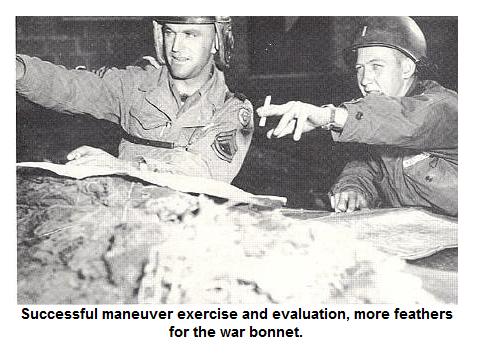
My mission was to fight
a delaying action until the 1st Infantry Division
could get into position. Fortunately my area of operation was
a valley between two hills which made it difficult for the
enemy to maneuver and bring much fire power on my small
reconnaissance platoons. The umpires helped as they forced the
enemy to deploy and bring the necessary fire power into
position before they made my unit withdraw. This took time. I
delayed the enemy for over two days and I was upsetting the
maneuver time table, so they changed the scenario to get me
out of the action. For example, they declared a bridge that I
had destroyed was now usable which permitted the enemy to side
slip out of my area. Anyway, after the maneuvers my Battalion
and I received accolades from the 1st Infantry
Division and Maneuver Headquarters for an outstanding job.
This placed another feather in my war bonnet.
A Section Recalling a
Skiing Vacation to Switzerland and Liechtenstein is Omitted
External Inspections
By the spring of 1953,
the battalion had developed into a first class fighting
organization. The Army has ways to evaluate a unit’s
capabilities and when we were externally tested by USAREUR
inspectors, we passed the three major tests used to determine
combat effectiveness with flying colors.
The Command Maintenance
Inspection which determined the mechanical readiness of our
vehicles and equipment and one in which an armored unit
usually struggles to pass, was a resounding success. Each
company in the battalion received a superior rating, the best
you can get, and you really have done something when you
receive one, but to have the Headquarters Company receive a
superior rating as well, was truly remarkable.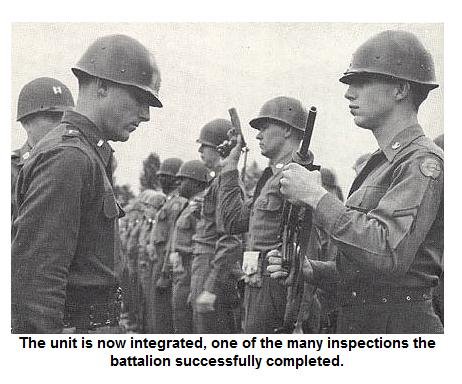
The Inspector General’s
inspection was designed to determine the overall condition of
the unit including personnel. This is a very difficult
inspection to get a high rating on, as you didn’t know what
the inspectors were going to do. In your training, you have a
lot of secondary subjects that you have to cover, such as the
T-I & E Program. I can’t recall exactly what the acronym
means, but as I remember it was the Troop Education and
Information Program, which I considered a waste of time. It
covered a variety of subjects such as current events. One of
the questions asked of our privates was which way does the
Panama Canal flow. If he knew, I am sure it would make him a
better private. Others questions asked were about chemical
warfare and like. Again we did well with straight superior
ratings for all companies and the headquarters.
The last test was the
Tactical Training Test used to check your overall combat
capability. This was done under simulated tactical conditions.
I was proud of the Battalion as it performed in an outstanding
manner. Out of a possible one thousand points, our score was
nine hundred and thirty seven, a score unheard of before that
time. This was definitely a superior performance and the
testing officers had high praise for us and considered us an
outstanding combat organization of professional personnel.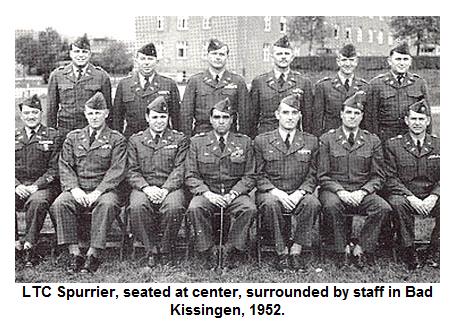
One of the reasons for
our success was the selection of personnel in command
positions. Over the years, I received officers from the
Regiment with questionable capabilities and some that were
difficult to handle. Unfortunately, most were senior in rank.
I tried them in command positions, but that didn’t work. I
actually “ B “ Boarded an officer for inefficiency, which was
a method of relieving an inefficient officer from active duty.
In the companies, I placed young officers, mostly from West
Point and other military schools in command. I called them my
“ young tigers “; these hard chargers were Johnny Jones, Joe
Schmalzel, George Hoge and Hill Dickerson.
The Regimental
Commander, Colonel Curtis was extremely pleased with our
performance in the three inspections and I received one of the
best efficiency reports I ever had. One, that I am sure, was
looked at very closely when I came up for promotion. It was
another feather in my war bonnet.
Stateside Assignment
Like all good things,
this too came to an end. It was the summer of 1953 and I was
due to rotate back to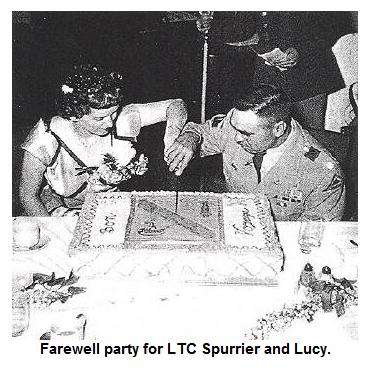 the States. Earlier in the year, I had
written General Pee Wee Collier, Commanding General of the U.
S. Armor School, offering my services as a Reconnaissance Unit
specialist, as I had just completed four years with this type
of unit. He wrote back and said he would try to flag me for
assignment to Knox, which he did. So, in late spring, I
received orders assigning me to the Armor School at Fort Knox. the States. Earlier in the year, I had
written General Pee Wee Collier, Commanding General of the U.
S. Armor School, offering my services as a Reconnaissance Unit
specialist, as I had just completed four years with this type
of unit. He wrote back and said he would try to flag me for
assignment to Knox, which he did. So, in late spring, I
received orders assigning me to the Armor School at Fort Knox.
As our time for leaving
grew near, the battalion gave us many departing courtesies and
parties. The final party was given just before we left and the
officers had a grand time roasting me and performing a very
humorous skit recalling my time as their commander. It was
with many fond memories, wet eyes and sad heats that we
departed Bad Kissingen for Bremenhaven and shipment back to
the United States.
Col.
James Ray Spurrier, USA (Ret), 86, passed away on December 27,
2004 in El Paso, TX. He is survived by his beloved wife of 63
years, Lucile Lafferty Spurrier, their three daughters, Patricia
S. Bright,
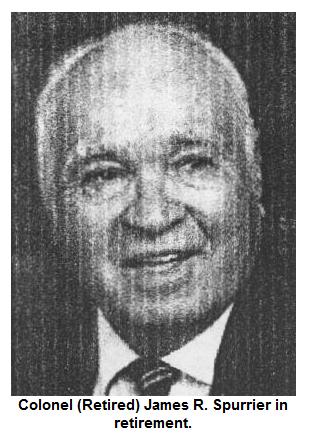 Lucile (Cindy) S. Christie, and Sarah (Sallie) S.
Stewart, two sons-in-laws, Theodore Christie and Thomas Stewart,
four grandchildren, Dawn W. Tillett, James R. Bright, Wendy W.
Hall, and C. Spens Woodroof, ten great grandchildren and ten
nieces and nephews. He was a regular Army officer for 25 years
and served in the Pacific Theater during WWII. He was awarded
the Silver Star, Bronze Star with Oak Leaf Cluster, the Purple
Heart, the Distinguished Unit Citation and the Combat Infantry
Badge. He received the Army Commendation Medal, the U.S. Cavalry
Medal, and the Gold Medallion of the Order of St. George. He was
appointed Honorary Colonel of the 12th Cavalry and named
Distinguished Graduate of the Oklahoma Military Academy. After
moving to El Paso in 1973 he founded the U.S. Horse Cavalry
Association for preserving the history, literature and artifacts
of the horse cavalry. He was the first Chairman of the Board and
was President for over 20 years. He was an accomplished polo
player and participated in the game until age 60 when he traded
his polo mallets for golf clubs. He continued to be active on
the golf course for another 20 years. Jimmie's gregarious
personality will be deeply missed by family and friends.
Visitation at Kaster-Maxon & Futrell Funeral Home, 8817 Dyer,
Jan. 6, 2005, 4 P.M. to 8 P.M. Services at the German Chapel,
Fort Bliss, TX, January 7, 2005, 1 P.M., graveside at Ft. Bliss
Cemetery, 2 P.M. No flowers; donations can be made to the U.S.
Cavalry Association, P.O. Box 2325, Fort Riley, Kansas 66441. Lucile (Cindy) S. Christie, and Sarah (Sallie) S.
Stewart, two sons-in-laws, Theodore Christie and Thomas Stewart,
four grandchildren, Dawn W. Tillett, James R. Bright, Wendy W.
Hall, and C. Spens Woodroof, ten great grandchildren and ten
nieces and nephews. He was a regular Army officer for 25 years
and served in the Pacific Theater during WWII. He was awarded
the Silver Star, Bronze Star with Oak Leaf Cluster, the Purple
Heart, the Distinguished Unit Citation and the Combat Infantry
Badge. He received the Army Commendation Medal, the U.S. Cavalry
Medal, and the Gold Medallion of the Order of St. George. He was
appointed Honorary Colonel of the 12th Cavalry and named
Distinguished Graduate of the Oklahoma Military Academy. After
moving to El Paso in 1973 he founded the U.S. Horse Cavalry
Association for preserving the history, literature and artifacts
of the horse cavalry. He was the first Chairman of the Board and
was President for over 20 years. He was an accomplished polo
player and participated in the game until age 60 when he traded
his polo mallets for golf clubs. He continued to be active on
the golf course for another 20 years. Jimmie's gregarious
personality will be deeply missed by family and friends.
Visitation at Kaster-Maxon & Futrell Funeral Home, 8817 Dyer,
Jan. 6, 2005, 4 P.M. to 8 P.M. Services at the German Chapel,
Fort Bliss, TX, January 7, 2005, 1 P.M., graveside at Ft. Bliss
Cemetery, 2 P.M. No flowers; donations can be made to the U.S.
Cavalry Association, P.O. Box 2325, Fort Riley, Kansas 66441.
|